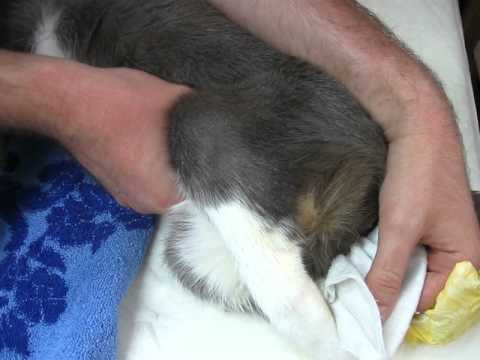It’s not pleasant to think about, but intestinal parasites (also known as intestinal worms) are quite common in cats. In fact, according to the Cornell Feline Health Center, up to 45% of cats will suffer an infestation of worms at some point during their lives. Most cats are exposed to worms and some may even be infected, but show no outward symptoms.
Connect with a verified veterinarian in minutes. Licensed vets are available 24/7 to answer your questions. No need to worry about your furry family member.
Intestinal Worm Infestation
How does your fur baby develop an infestation of worms? Most often, infestation occurs when a cat steps into feces infected with eggs or even adult worms. When the cat cleans her feet, she may ingest the worms or eggs when grooming her feet. Your cat may even develop a worm problem if she goes outdoors and hunts. Rodents are the main culprit, as they may have worm larvae (immature worms) living inside them. When your kitty kills and eats the rodent, she may eat some of the larvae, which then stay and thrive inside your cat’s digestive system.
Even fleas can carry worm eggs or larvae. If your cat swallows a flea or is bitten by a worm larvae (carried on the flea) then worms can then take up residence inside your cat’s intestines. Not only this, but kittens nursing from their worm-infected mothers can develop intestinal worms. Now, this sounds an awful lot like a sci-fi horror movie. If you’ve lost your dinner while reading these paragraphs, we apologize. That wasn’t our intent! It’s just a good idea to understand how a cat, including your own precious fur ball, can come into contact with worms and possibly develop an intestinal worm infestation.
Most Common Types of Worms in Cats
Let’s take a look at some of the most common types of worms in cats:
1. Roundworms: this is one of the most common intestinal worms in cats. They can cause illness or even death, depending on a cat or kitten’s health. These worms have round bodies and can be from 3-6 inches long. Unlike some worms, roundworms are free-swimming in the intestine. These worms can affect both kittens and adult cats. Unfortunately, roundworms don’t just stay in the intestines, but can eventually move into other tissues including the liver, lungs and muscles.
Roundworms can also remain dormant within a cat’s body. This is especially bad for female cats during their breeding years. The eggs hatch and the larvae come out when the cat’s pregnant. The worms can then be passed to the kittens before they’re born or through the mother’s milk.
2. Hookworms: are another common intestinal parasite in cats. These worms are smaller than roundworms—they’re usually smaller than an inch long. These worms attach themselves to the intestinal walls with teeth, and feed off the blood and tissues of the cat. Hookworms can move from place-to-place; when they move, small open sores may remain from where the worms were feeding.
Cats usually become infested with hookworms after grooming themselves, they can come when the cat eats an animal that was infected with the parasites, or the worms can even migrate through the skin. What a lovely thought!
3. Tapeworms: are typically long—they can be from 4 to 28 inches long and are rather ribbon-like. Tapeworms usually come from another animal the cat has eaten. They can also come from fleas a cat accidentally ingests when cleaning herself. These parasites, like hookworms, attach themselves to the wall of the intestines and feeds on the tissue and blood.
Tapeworms are long, but can break off into segments (called proglottids) that resemble grains of rice. These are tapeworm larvae that can stay inside your cat, or come out in her feces.

Review symptoms, medications & behavior to keep your pets healthy with a Vet Online in just minutes.
Ask a Vet Live NowSigns & Symptoms of Worms in Cats
Symptoms can vary depending on which worm has taken up residence inside your fur baby. Even so, these are some of the most common signs and symptoms your pet has an intestinal parasite problem:
- Constipation
- Weight loss
- Bloody Stool
- Diarrhea
- Round, or potbelly tummy (may also look bloated)
- Coughing
- Worms or worm segments present in feces
- Worms or worm segments under her tail and near the anus
- Dull coat and/or hair loss
- Skin inflammation/irritation
- Rubbing her rear end on the floor (carpeting is especially preferred!)
Not only can worms be dangerous for your cat, but some worms can also infect other pets in the home, you and your family.
It’s important to take your cat to the vet to be examined if you notice any of these health issues. Handwashing after touching your cat is also important, especially if you suspect your cat has worms. This helps to avoid the spread of the parasites to your family and other pets.
How Are Intestinal Worms Diagnosed and Treated?
A physical examination is usually all it takes for the vet to diagnose worms in cat. They may also put a sample of your cat’s stool under a microscope and/or send a sample to a lab to be tested. Your vet may also order other tests including blood tests.
If the vet diagnoses your kitty with worms, then they will recommend the best treatment for the cat. Your cat will need specific medications, called cat deworming medicine, depending on the type of worm she has. There are also medications that treat several types of worms—your vet will choose the best medication for your cat’s condition.
Deworming Medication for Cats Side Effects
Just as with any medication, deworming treatments can also cause side effects in your cat. The most common side effects include loss of appetite, diarrhea, vomiting, increased salivation, and lethargy. Some pet parents also say their cats are not very alert after taking deworming medications.
Kittens are more prone to experience side effects than adult cats, especially diarrhea. If your kitten becomes too hot/cold to the touch, develops tremors, blood in her stool, white gums, etc., then she needs to be taken to the vet as soon as possible. These are all signs of a dangerous side effect from the dewormer.
What to Expect After Deworming a Cat
Once the deworming medication begins to work, you may find worms and/or worm segments in your cat’s feces. This is normal. Medications are generally given by mouth at specific intervals, depending on the type of worm, the degree of infestation, etc. Your vet will likely want to follow up with your cat’s health and may ask you to bring her in for checkups at regular intervals to ensure the dewormer has worked. During the checkup, the vet may do another fecal exam to make sure the worms are gone.
Best Over the Counter Cat Dewormer
According to vets and pet parent reviews, one of the best over the counter cat dewormers is Bayer Dontral Broad Spectrum Dewormer. While this medication does tend to run higher, the high ratings and reviews all state the medication works. One review said this medication has been very helpful in treating foster cats and kittens that have come with intestinal worm infestations. Dontral treats some of the most common worms including tapeworms, roundworms and hookworms. The medication is proven to kill these parasites and usually only takes a single dose. In addition, each pill can easily be broken in half, so you can adjust the dose for smaller cats and kittens.
This broad spectrum dewormer works by damaging the worm’s skin, causing the parasite to disintegrate, and then be removed in the cat’s waste. In hookworms, the medication causes paralysis, so the worms aren’t able to grip the intestinal wall. Drontal is safe for cats and kittens over 1 month old and 1.5 pounds and up. The dose is one tablet for each 4-8lbs of body weight.
Possible side effects with this medication can include loss of appetite, vomiting, diarrhea and increased salivation. If you notice these or other side effects that seem unusual or get worse, then be sure to call your vet. Please note that these tablets are not for use in kittens under one month old or weighing less than 1.5 pounds.
Dewormer for Cats Profender
Another highly recommended deworming medication for cats is Profender. This product is only available from your vet with a prescription. Profender is another broad spectrum dewormer that helps to rid your fur baby of hookworms, tapeworms and roundworms. Unlike other dewormers, Profender is topically applied (put on the skin), rather than given in tablet form. This makes dosing your cat or kitten much easier—no pills to make sure kitty swallows! This medication is safe and effective and works in one dose.
This medication is for cats over eight weeks old, weighing from 2.2 lbs and above.
Profender works by going through the skin and entering your cat’s bloodstream, where it travels to the intestines. From there, the medication kills the parasites, which are then eliminated in your cat’s feces. While this medication is safe for most cats, it should not be used on kittens under 8 weeks old or smaller than 2.2 lbs. In addition, this product’s safety in breeding, pregnant or lactating cats has not been determined.
Side effects are rare, but may include vomiting, excessive licking, scratching the site where medication was applied, excessive salivation, lethargy, hair loss, agitation or nervousness, respiratory irritation, and/or tremors. Be sure to call your vet about any side effects that seem unusual or harmful to your kitty. Intestinal parasites are a common problem with cats and can be dangerous not only to your kitty, but to other pets, you and your family. If you suspect your cat has worms, then be sure to take her to the vet where she can be properly diagnosed. Your vet will be the best guide when it comes to diagnosing and treating of your cat’s medical condition.
Connect with a verified veterinarian in minutes. Licensed vets are available 24/7 to answer your questions. No need to worry about your furry family member.

Kim
Kim is a talented author, who loves animals especially dogs. She engaged in writing books and articles relating to animals a decade ago. Kim resides in Chicago with her husband and son. The family is the proud owner of a dog and a parrot (Jack and Lily). Kim wanted more than these two pets, but her husband put his foot down... She often visits elementary schools to talk to the kids about what she learned about pets and how they could learn from them.
Review symptoms, medications & behavior to keep your pets healthy with a Vet Online in just minutes.
Ask a Vet Live Now



